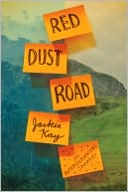 Red Dust Road: An Autobiographical Journey
Red Dust Road: An Autobiographical Journey
by Jackie Kay
Atlas & Co. 304 pages, $24.
AWARD-WINNING Scottish poet, playwright, educator, and novelist Jackie Kay may not yet have the name recognition in the U.S. that she deserves, but Queen Elizabeth appreciates her: in 2006, she was awarded the MBE (Member of the Order of the British Empire) for her service to literature. Kay’s exuberant personality makes this all-too-brief memoir come alive. Born in 1961 in Edinburgh, her mother was a Scottish nursing student, her father a Nigerian agriculture student in a university exchange program, the two having met at a dance in Aberdeen. Social pressures being what they were in those days, she was put up for adoption. Years later, when in her early twenties, Kay met writer Audre Lorde, who assured her she could be “proudly African and Scottish, and that [Kay] should embrace both. One need not exclude the other, she said in her decisive drawl.”
Kay’s adoptive parents sound like the parents that every child wants: unconditionally loving and nurturing and also a lot of fun—frequent party-givers who filled their home with jazz music and theatricals. Kay considers them her real parents and didn’t notice until she was seven that their skin colors didn’t match. In Scotland, her parents’ political affiliation (“lifelong and committed socialists” and Communist Party members) rendered them aghast at the idea of their daughter having to make obeisance to the Queen upon receiving the MBE. Writes Kay: “I thought I must be the only person I know whose parents are so cool that they advised me to reject a medal from the Queen.”
It wasn’t too difficult for Jackie Kay to track down, with the help of the Internet and some judicious phone calls, her biological parents, and much of her memoir revolves around the personalities of these two remarkably different people, whose only similarity in their mature years seemed to be their religious fervor. Her biological father, married with four children, had become a born-again Christian. Kay’s first encounter with him, at a hotel in Abuja, Nigeria, was uncomfortable in the extreme. Unless Kay acceded to his demands to be born again, he would refuse to tell his wife about his daughter’s existence. Kay did come out to him, mentioning her lover of fifteen years (they’d broken up just before her trip). He seemed particularly fascinated by the mechanics of lesbian sex, urging his daughter to tell him everything. He said that the idea of two women together didn’t bother him, but male homosexuality disgusted him.
Kay’s chapters hopscotch between her family in Nigeria and her biological mother, who was still living in Scotland. When pregnant with her own child, Kay set out to find her mother. Possibly afflicted with memory loss and having a history of psychiatric problems, she had converted to Mormonism as a young adult, married a man from Singapore, and had several children (“who look like me,” Kay notes when she sees their photos). She too tried to convert Kay, who admits: “In the weeks after that first meeting, I felt jangled and upset by it.” Not able to understand why she was so distressed, she decided she was “grieving the imaginary mother I’d had in my head. The one who was madly in love with my father, a handsome cross between Paul Robeson and Nelson Mandela.” In truth, her birth mother was “sad and troubled.”
Kay traveled several times to see her biological parents and their families, sometimes combining her visits with work—she’s a professor of creative writing at Newcastle University in England—and experienced moments of transcendence in her ancestral village in Nigeria. “You cannot find yourself in two strangers who happen to share your genes,” she writes in an interlude titled “Fantasy Africa.” “You are made already, though you don’t properly know it, you are made up from a mixture of myth and gene. … I have found them both now. But I have not found myself.”





